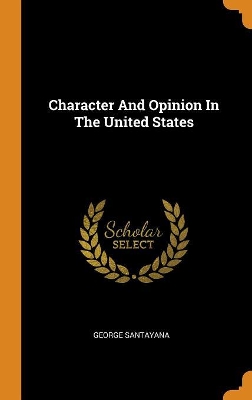George Santayana was one of the most influential twentieth-century philosophers. Because of his broad-ranging interests and lack of any permanent home in one particular country, he has often been stereotyped as a meditative philosopher removed from the world, living in what he himself called the "realm of spirit" among eternal essences. While there is some truth in this characterization, it is also true that Santayana was a penetrating analyst and critic of contemporary societies.'Character and Opinion in the United States' is his comprehensive critique of American thought and civilization and reflects the detached cosmopolitan perspective that lent his criticism its characteristic objectivity and strength. Santayana's subject here is the conflict of materialism and idealism in American life. In his view there exists a dualism in the American mind: One side, dealing with religion, literature, philosophy, and morality, tended to stay with inherited, old doctrines-the genteel tradition-and failed to keep pace with the other, practical side and its new developments in industry, invention, and social organization. Santayana traces the first mentality to Calvinism and its sense of sin, an attitude out of keeping with a new civilization and the dominance of practical interests. As a consequence of separating philosophy from everyday life, its study merely served religious and moral interests cut off from the free search for truth. At the heart of the book is Santayana's examination of the influential thought of William James and Josiah Royce, who typified for him the dilemma of American thought. The subordination of thought to social form and custom underlies Santayana's sharp critique of academic philosophy at Harvard where he early on studied and taught. He was disturbed by the very idea of philosophy as an academic discipline. Philosophy, he felt, should be an individual, original creation, "something dark, perilous, untested, and not ripe to be taught" Santayana's analysis of how social imperatives may impede the pursuit of knowledge remains pertinent to contemporary intellectual debate. This volume ill be of interest to philosophers, intellectual historians, and American studies specialists.
- ISBN10 0343151677
- ISBN13 9780343151676
- Publish Date 15 October 2018 (first published 30 January 1991)
- Publish Status Active
- Imprint Franklin Classics
- Format Hardcover
- Pages 252
- Language English
